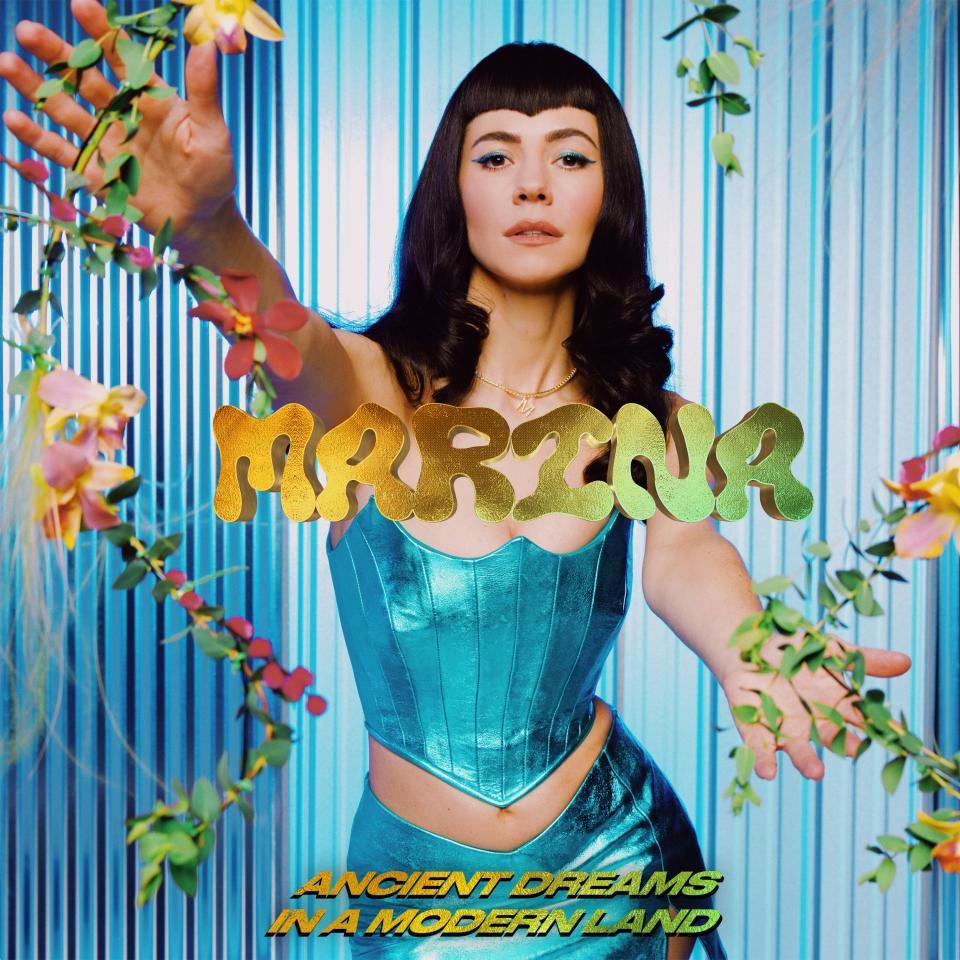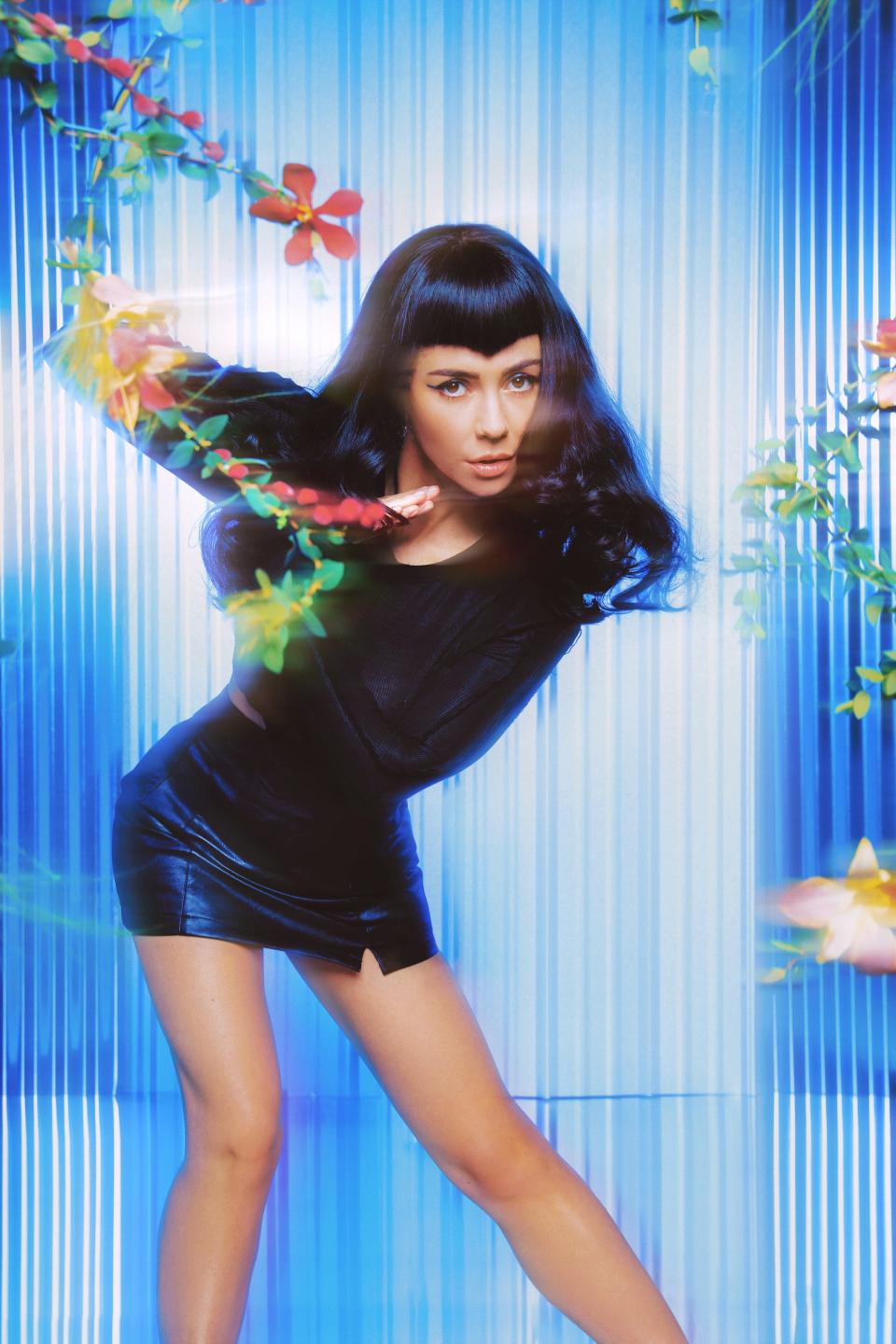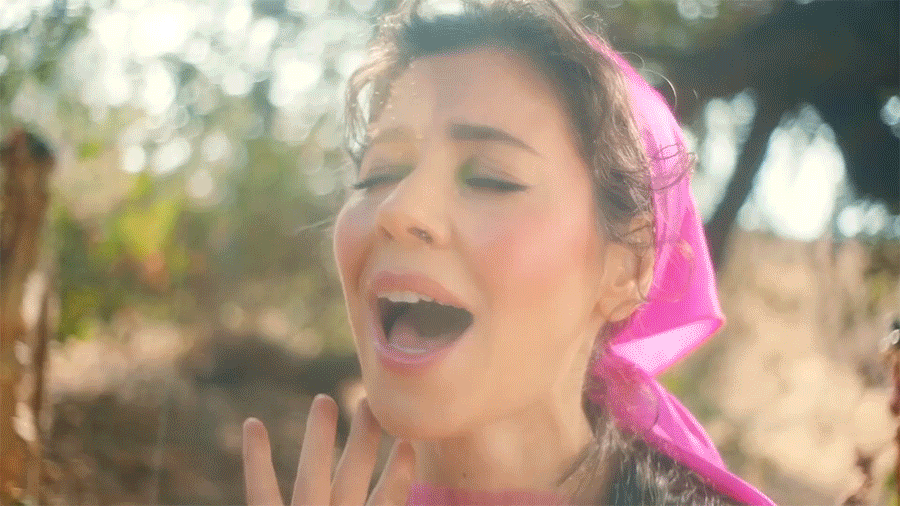On Marina’s New Album, a Pop Star Gets Real (But Makes It Dancy)
In “Purge the Poison,” a lead single on Marina’s new album, Ancient Dreams in a Modern Land, the Greek-Welsh singer assumes the role of Mother Nature—and she’s pissed off about how human beings have treated her. She sings, “Need to purge the poison from my system / Until human beings listen / Tell me, who do you think you are?” You’d think a pop song preaching environmental reform would be contrived, but Marina manages to make it an earworm-y dance anthem that packs a punch. As one fan put it on YouTube, it makes you want to “eco-friendly twerk.”
Ancient Dreams is Marina’s fifth studio album, and it’s full of these sorts of juxtapositions; she isn’t afraid to deliver an uptempo pop beat and explore the world’s dark, ugly truths at the same time. Among other themes on the record, she alludes to global warming, misogyny, heartbreak, and racism. She asks us to think about how we can better ourselves, and her lyrics hit you when you least expect it. “People tend to shy away from these kinds of issues in songs,” Marina tells Vogue. “But pop music is such an amazing vehicle to discuss those issues, and it doesn’t matter if people agree with you or not—it’s a conversation starter. That’s the most powerful thing about art.”

Once an endless cycle of Top 40 hits and one-hit wonders, the pop genre is now grittier and more reflective of the times, with artist like Billie Eilish and Olivia Rodrigo creating work that feels unapologetically raw. Marina has always worn her heart on her sleeve, but Ancient Dreams is her boldest, most emotional outing yet. She wrote much of the record during the pandemic, when she felt the world’s pressing issues becoming harder to ignore. “I felt this anger at myself for the life I’ve been living and we’ve all been coaxed into living,” Marina says. “The way that we were living pre-COVID wasn’t sustainable or, to be honest, enjoyable.”
Through the record, she wanted to acknowledge those lingering feelings of hopelessness but help to uplift people too. An underdog medium like pop music seemed, to her, the perfect way to do that. “I’m very playful with how I write with music,” she says. “There’s always a bit of a tongue-in-cheek essence to it.”
Below, Vogue chats with Marina about Britney Spears, writing through the pain of a breakup, and her upcoming concert in the California desert.
Vogue: The first song you wrote for the album was “Man’s World,” in which you sing, “I don’t wanna live in a man’s world anymore.” Would you say the album is deliberately feminine?
Marina: Femininity has been such a negative trait for so long. It’s shameful to be feminine, whether you’re a man or woman. That’s dating back hundreds of years, and I think it’s really to the detriment of society because we’ve all had to try and be more masculine in order to succeed or to be accepted. We all have masculine and feminine traits. Masculinity is being goal driven, disciplined, forceful; femininity is what your relationship with nature is, being nurturing and intuitive. There’s a huge connection [between] what’s happening with our planet right now and the lack of femininity in the world. On a personal level, I really wanted to embody more of that [femininity] and to work on that in myself. That’s really the main theme of the whole record.
Do you feel the music industry is still very much a man’s world?
I’ve experienced it in that there aren’t many women employed in the labels. My record label is one of the few that has a woman at the top, both in the U.K. and the U.S., but that’s still quite rare. With studios and production, it’s predominantly male still. Sometimes it’s boring to discuss, but we do need to keep talking about it until that changes. Five years ago, we still weren’t really having these discussions.
Let’s talk about “Purge the Poison,” one of my favorite tracks. You reference Britney Spears in it, and there’s been a lot of talk around the music industry’s treatment of her. Did you connect with her in that kind of way?
I think about her a lot because I’m such a big fan. The way we have treated women growing up and the way that you and I grew up with the tabloids—that all contributes to how I’ve felt as a woman growing up in this music industry. I’m happy to see how things are changing. Britney, unfortunately, has become this symbol for a very specific treatment of women. I really hope that things are going to change for her; she’s got such a magic quality. We didn’t have the same understanding of mental health that we do now. It’s very clear that she was having a nervous breakdown, and the only response people should have had is compassion. But it was pretty much the opposite—just being completely disrespectful and making fun of her. And in a way, that’s still continued online, even with my own fan-base experience. [It’s still popular] to make fun of artists.
On “New America,” you really go in hard on America’s dark history, with references to both stolen land and systemic racism. Was there a specific event that got you thinking about doing that song?
George Floyd’s murder, definitely. I wrote some of the song the day after that happened, and then I realized that I shouldn’t be writing this right now. I needed to understand, on a much deeper level, what was happening. [American history] is mine, but it’s not mine: I’m not American, and I haven’t lived my whole life here. The U.K. certainly doesn’t have a clean track record, nor does Greece, and these are the places where I’ve grown up. But America has been this empire—it’s like the world’s superpower—and we all have looked to America for how to progress and evolve. I feel like there’s been a feeling of relief after the past year, that we can at least be truthful about what the United States is and what the social problems are here—as opposed to just continuing as if they don’t exist.

Your work span genres, but do you think the pop genre is changing in that artists can now explore these darker themes?
We have a really healthy landscape now compared to 10 years ago. Now, anything goes! It’s so much more freeing and healthy. Teenagers and people in their 20s need to hear songs about what they’re actually going through. We don’t need 90% of songs to be about partying in the club—though we do need those songs too. We need a balance.
Another song that really struck me was “Venus Fly Trap.” You sing, “Why be a wallflower when you can be a Venus flytrap.” You don’t strike me as a wallflower.
I think I’m in between! I have periods of being a wallflower. It doesn’t really relate so much to being flamboyant or extroverted; it’s more about how you feel internally about yourself. It’s a celebratory song. I’ve carried a lot of shame in my life that didn’t belong to me, and I’ve only recently really been able to liberate myself from that. As a result, I’ve been able to look at my career and feel proud of the fact that I haven’t had to compromise that much. All artists have to compromise a little, but it’s amazing that I’ve had the creative freedom to write the records that I want. You don’t have to conform in order to see success in your creative life.
Speaking of creativity, I’ve been digging the fashion you’ve been wearing in your new music videos. What’s been inspiring you in the realm of style lately?
I’ve been doing very feminine, structured stuff. I’ve been working with a designer called Olima. He made this vampy, widow’s-peak corset for the album cover—we did them in metallic pink and baby blue. He also did the outfits for “Man’s World” and “Venus.”
You also write a lot about love and heartbreak on this record, like in “I Love You But I Love Me More.” Did this stem from personal experience?
All of those songs stemmed from a breakup. I was in a relationship for five and a half years. It was my longest relationship to date; I loved and still love the person dearly. I use songwriting as a way to work out how I feel about something because my brain covers up loads of stuff, and it takes me a while to sift through the layers of detritus to figure out what decision to make and how I actually felt about this. When you’re in a relationship, there’s a very normal tendency to cover your own feelings up in order to maintain the health of the relationship, but that doesn’t work for anyone in the end. The truth is, the thing that holds people together is authenticity.

It being Pride Month, I also wanted to ask about your queer fan base. You’re very much a gay icon, and I wonder if you’ve felt a special connection with queer fans.
On a personal level, with [my LGBTQ] fans, there’s definitely an emotional connection. We’re able to bond on not being allowed to be ourselves growing up. There’s such an urge to express yourself and to form an identity, and that’s something I so deeply relate to. I think it’s why I’ve had quite a wide-ranging career in terms of the visuals and the genres of each album because I was always trying to find an identity or a mode of expression that felt good. Having those connections with them makes writing music worth it.
Do you think you’ve finally found your genre with this album?
No. [Laughs.] I’ve done something different each record, so I feel that maybe my identity as an artist is about my lyrics, really—it’s not so much about the production. Who knows what I’m gonna do next!
You’ll be putting on a special digital live concert, “Ancient Dreams: Live from the Desert,” on Saturday at a Californian desert. What can you tell us about it?
There’s lots of acid colors to contrast with the background. There’s only two outfits, but they’re very, very well made. I can’t tell you much!
Ancient Dreams in a Modern Land is out on June 11.
Originally Appeared on Vogue

